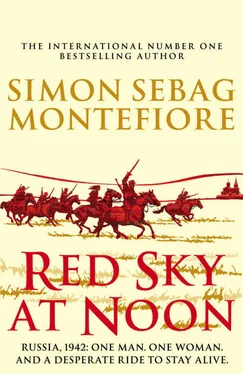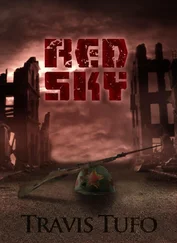When the officers returned, Elmor placed the men on both sides of the road. Benya lay in the grass with Prishchepa and Little Mametka. A skylark dived and flipped over him; higher still, the vultures circled. He prayed the horses wouldn’t whinny, but as Panka liked to say: ‘You can train horses to do anything except sing or be silent’. After a while, Lyovka, the scout, rode down to them fast – ‘They’re moving,’ he hissed – and leaped the ditch, leaving his horse in a bower of poplars just back from the road. Mandryka was coming. Benya pulled the wooden butt of the Papasha into his shoulder and against his cheek and waited, heart scudding.
And there they were: the Schuma on horseback loping down the track and in the middle of them all Mandryka. Dirlewanger was not with them, neither was Kapto or the little girl. When they were just about level, Elmor opened fire with his Degtiarev, aiming right at Mandryka. Benya saw him jerk bolt upright and knew he had been hit even before he opened fire on Mandryka himself, but it was hard to get a clear shot after that. He hit two of the guards for sure but then they had closed in around their leader and they were galloping for the safety of the village, and just at that moment Lyovka went down; heavy machine guns scythed down a couple of others, including Geft. Benya tried to lie flat, panicking.
Where was the gunfire coming from? Then down the lane Benya saw German soldiers and Schuma jumping out of trucks and fanning out, their fire raking the partisans, ambushing the ambushers; and he knew he had to run back or they would trap him. He sprinted towards the horses, spluttering for air.
A punch in the shoulder threw him to the ground. He felt an intense burning feeling, and black water closed above him, and around him.
Kolyma on a hot summer’s morning in June, a day Benya would never forget. Nor would Russia. Jaba’s barracks was suffocatingly hot, buzzing with mosquitoes, gnats and obese bluebottles that drove the men to distraction. Benya, who by now had covered Macbeth , Eugene Onegin , The Count of Monte Cristo and much else, was reciting a sonnet of Shakespeare to his pupil, Jaba, the Boss, sitting in just a pair of khaki shorts. Smiley (who officially worked in the dining block, hence the supply of food) stirred the pot of beet soup; Deathless was getting out the dumb-bells (Jaba did his calisthenics after his literary lesson); and Prishchepa, the boyish Cossack, was carving a wooden horse, all of them just in their underwear.
‘Beautiful lines,’ Jaba said. ‘Isn’t Shakespeare really just saying “Life is like a plate of lobio beans”?’ He stood up as a staccato twang rang from the loudspeakers and the rails started to sound. This was highly unusual. These were only used for reveille, or prisoner escapes, and were almost never rung in the middle of the day.
‘What the fuck, Boss!’ said Smiley.
The loudspeakers zonked tinnily and then out buzzed a familiar nasal voice: ‘This is the Commandant. I have a news announcement. The traitorous Hitlerite Germans have betrayed Russia and invaded. Never has there been a more wicked infamy and we shall repay it. Under the command of Comrade Stalin, the Soviet forces have counter-attacked and are repelling the Hitlerite invaders on all fronts. Long live our brave Red Army! Long live our great Socialist Motherland! Long live our Great Stalin!’
‘What does this mean, Boss?’ asked Deathless.
The men glanced sulkily at each other. War would change things. Less food. More gold. Every Zek knew things would only get worse.
‘Quiet,’ said Jaba. ‘Are we so uncultivated that we interrupt a sonnet for this shit? Say the last two lines again!’
But Benya couldn’t concentrate.
Now the war was here: Hitler had attacked his Soviet ally, ending Stalin’s diabolic compact with the Nazis. He was almost feverish with excitement. Everything at last was clear. This was his war, his moment…
‘Hey, Golden!’ said Jaba, squeezing his cheek till it hurt. ‘Are you daydreaming? This is not our war . Governments fight wars; we don’t recognize any state! Life is just a plate of lobio beans!’
But Benya had walked straight from the barracks to the Commandant’s office escorted by a cloud of gnats, hovering in a column just above his head. Beyond the wire, the bleak mountains gleamed like jagged silver and, in the distance, a herd of reindeer grazed on a steep hillside. Outside the office, a prisoner was already repainting the slogans:
GLORY TO STALIN, BRILLIANT MILITARY COMMANDER
UNDER STALIN’S LEADERSHIP, ONWARD TO VICTORY
UNDER STALIN’S LEADERSHIP, WE WILL DEFEAT THE NAZI HYDRA
DEATH TO HITLER AND HIS HENCHMEN
WATCH WHAT YOU SAY, SPIES ARE EVERYWHERE
DEATH TO SPIES
MORE GOLD FOR OUR VICTORY!
WELCOME TO MEDYAK-7
Outside the Commandant’s office, a Mongolian guard shoved him so hard that he fell. But he persevered, and because the guard knew that Benya was protected by Jaba, he let him in to see the Commandant’s assistant, a man whose eyes bulged so gloopily behind his bottle-thick spectacles that they resembled hard-boiled eggs.
‘What can I do for you, Prisoner Golden?’ asked Lieutenant Bobkin in a neutral drone. Now in a blue Chekist uniform, he was an ex-prisoner who had made the crossover from Zek to officer of the NKVD. ‘What’s your request?’
‘I want to volunteer to fight the Nazis,’ said Benya.
‘State your code!’
‘KRTD 58.8. Ten.’ Every prisoner had a code; KRTD meant Benya was guilty of counter-revolutionary Trotskyite activity; 58.8 denoted the clause of the criminal code reserved for those guilty of terrorism; ten the years of his sentence.
‘Ten?’ said Bobkin. ‘You’ve been misinformed. Your sentence is ten years for each indictment plus five for counter-revolutionary agitation, to be served consecutively.’
Benya staggered, so great was his shock. ‘Wait, so how many is that?’
‘Twenty-five in total.’ Bobkin sighed. ‘Put your request in writing, Prisoner Golden, and I will pass it on to the authorities. But I have to warn you, you’ll die here in Kolyma.’
The night was drenchingly hot in the village of Shepilovka and, when he awoke, Benya found himself a prisoner in one of the village stables that had been converted into makeshift cells. The bars to his cell were nailed crooked and he thought of escape, but he was afraid to move, too broken. His terrified mind jerked from thought to thought: his shoulder was hurting, his shirt sopping wet with blood, and it had been hours since he had eaten or drunk a thing.
He could see through the bars that the flags in the village were at half-mast and the bodies swayed on the makeshift gallows in the courtyard. He couldn’t tell who they were. Death just wiped their personality as a rag wipes letters off a blackboard. Perhaps they were the lucky ones, thought Benya.
But Mandryka was dead. They had got him! He had heard the music, a discordant village band, out-of-tune trumpets and balalaikas, playing a death march. This had been followed by volley after volley of gunfire as Mandryka’s men let off their guns in salute for their fallen chieftain, and the beginnings of a drunken wake, accompanied by the breathy notes of an accordion. Benya listened to the songs – he knew some of them: ‘Black Crow’, ‘Volga-Volga’. As speeches were made, and more volleys fired, he sensed a spasm of a grotesque and truly terrifying spirit abroad, made up of military ritual and peasant drunkenness and the lairy cruelty of this black-hearted time. He waited for what would happen next. He was bleeding from his shoulder; the pain made him sweat, the shivers came in gusts, and he guessed he would die. If it happens, at least be calm, he told himself, don’t beg, don’t shriek, don’t wet yourself, but then he knew he would do all those things, and anything, anything , to survive, and the hysteria made him shudder. We killed Mandryka, he told himself, at least we achieved something – and he remembered Melishko saying, ‘Maybe we’ll do something to make our families proud – even if they never know it.’
Читать дальше












